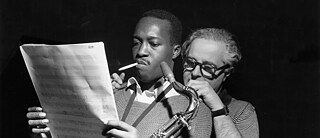Jewish International Film Festival
How two ex-Berliners helped shape jazz history

Screening at the Jewish International Film Festival, the engaging and informative documentary It Must Schwing! The Blue Note Story charts the genesis and legacy of jazz label Blue Note Records — which was started in New York in 1939 by German-born jazz aficionados Alfred Lion and Francis Wolff.
By Sarah Ward
Some applauded movies linger long after they’ve screened in cinemas or won trophies, while others seem to disappear as quickly as they arrived. The 2018 feature Green Book, for instance, fits the latter category. Based on the real-life experiences of African American pianist Dr Don Shirley, last year's Oscar winner for best picture explores the racism that plagued black performers during the era. Alas, by pushing an Irish American bouncer to the fore and filtering Shirley’s story through the man hired to drive and protect him, the movie adopts a highly questionable approach. Here, one person’s horrific treatment is weaved into an affable, crowd-pleasing tale of cross-cultural friendship, as is the widespread hatred that was endured by many others in the same situation.
By comparison, It Must Schwing! The Blue Note Story shares a somewhat common thread with Green Book, diving into the discrimination present in America and echoing throughout its music scene before the civil rights movement made headway. Thankfully, this engaging and informative film handles its material in a smart, astute and thoughtful manner. Chronicling the efforts of two German-born, jazz-loving Jewish immigrants who helped shape American jazz from the late-1930s onwards, Eric Friedler’s feature doesn’t spin a saviour story. Rather, as it steps through Alfred Lion and Francis Wolff’s lives in the US after fleeing persecution in Berlin, focusing on the creation and importance of Blue Note Records, it pays tribute to a label that championed equality and freedom as much as great jazz.
Upon arriving in New York, Blue Note’s driving forces immediately recognised the devastating similarities between the Nazi-era prejudices they were running from and the experiences of African Americans, and it made a significant impact on their business.

RESPECT AND UNDERSTANDING
Indeed, to hear It Must Schwing!’s interviewees talk about their time working with Lion and Wolff is to hear a tale dripping with respect. The two men adored jazz as an art form, revered the musicians they signed and — as well as searching for music with ‘swing’ (or ’schwing’ when said with a thick German accent, hence the film’s title) — they gave their collaborators the support they deserved. With Miles Davis, Herbie Hancock, John Coltrane, Sonny Rollins, Wayne Shorter, Thelonious Monk and Quincy Jones on their roster, Blue Note overflowed with talent.As more than one of the documentary’s interviewees happily note, Lion and Wolff paid them well. The duo also gifted them the space they needed not just to create memorable music, but to truly be heard. As Hancock comments: “Alfred and Frank wanted the truth to be told in the music, so they laid out a platform for the musicians to have a voice — and that in itself is a monumental statement about freedom, about respect for another human being, and an understanding about the reality of another person’s life.”
A seasoned television documentarian, Australian-born, German-based writer/director Friedler doesn’t need Hancock’s passionate words to make this message plain; however, there’s nothing like hearing it direct from a crucial source. The iconic pianist isn’t alone, with saxophonist Sonny Rollins offering similar sentiments — and fellow on-screen talking heads such as Jones, bassist Ron Carter, and saxophonist and composer Shorter joining what becomes a rousing chorus. Among Sheila Jordan’s effusive praise, the singer talks through the hostile mood swirling on the streets, painting a visceral picture.
Beyond its chats with jazz luminaries, as well as the family members, friends and colleagues that knew Lion and Wolff best, It Must Schwing! paints a picture in a more literal fashion, too. Bringing evocative images of 1930s, 40s, 50s and 60s America to the screen in moody computer-animated sequences, the film uses every tool at its disposal to convey the reality of the time, including via its unsurprisingly stellar soundtrack.
MORE THAN JUST AN ODE
As a result, It Must Schwing! captures four things in tandem, and does so with impressive detail. It’s an intimate and celebratory portrait of two men who overcame the defining global combat of the 20th century to dedicate their lives to the music they loved, to the extent that Lion even referred to Blue Note as his child. It’s also an ode to their label and the talent they helped foster, without whom modern jazz wouldn’t have become what it was.More broadly, the film serves up a snapshot of the volatile era that Lion, Wolff and their artists survived, shaped and helped give a rousing soundtrack, delving deep into the period’s highs and lows. What resonates most, however, is the documentary’s testament to the power of amplifying others, especially in times of difficulty, unrest and inequality; without Blue Note, the movie posits, American civil rights movement and modern American history would’ve sounded vastly different.
"It Must Schwing: The Blue Note Story" screens at the Jewish International Film Festival in October and November 2019. Tickets are available here.